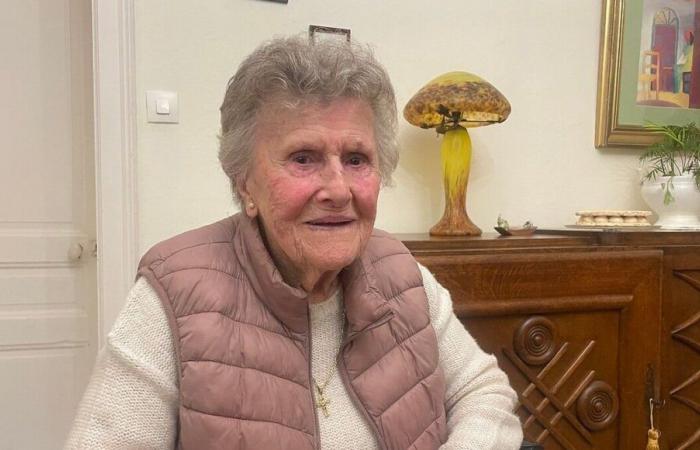
“These children from Alsace and Moselle were captured, dressed in a uniform that they hated, in the service of a cause that made them slaves. (…) Their tragedy must be named, recognized, and taught because it is that of the Nation“. This sentence pronounced by Emmanuel Macron, this Saturday, November 23 during the 80th anniversary of the liberation of Strasbourg highlights the destiny of hundreds of thousands of In spite of ourselvesforcibly conscripted into the German army during the Second World War. It would be forgetting the fate of nearly 15,000 young Moselle women, also incorporated under duress, between 1942 and 1944: the Despite-themselves.
“We are still called Krauts”, 80 years after the forcible incorporation of the “Despite Us”
Among these young girls born between 1923 and 1926, Yvette Didier, 102 years old today, is one of the last survivors in Moselle. She became an in spite of herself following a publication. “The Germans had published in the newspaper that all girls born after 1923 had to go to the Arbeit Dienst for 6 months. I was therefore summoned since I was from 1923.“Mosellane must carry out, by force, the Rich work servicein French, Reich Labor Service. A compulsory service in Germany and the territories it annexes. So when several German soldiers knock on the door and arrive at Yvette's house, “I cried. I remember, I was on the stairs of my parents' house and I was crying. I saw them walking like that with their boots on, I was crazy.“
She helped prisoners cross the border into occupied France
A few weeks before leaving for a German camp, not far from Heidelberg, the girl, just 19 years old at the time, was still helping her father smuggle escaped prisoners a few hundred meters from her home, in Joeuf (Meurthe-et-Moselle), then in occupied France. “There were customs officers at the time, we took advantage of them changing clothes to cross the border. I remember one time we almost got caught. When we arrived in front of the house where the prisoners were hidden, we realized that it was closed. Afterwards we went up the hill but we didn't know where to go even though we had the prisoner with us. And there we saw the Germans. in any case we could hear them with their boots. So we had time to go opposite. We saw them coming and if they had a dog, we got caught. We just had time to hide behind the wall. The patrol finally passed without spotting us.“
His father will not be so lucky; he will be arrested twice by German soldiers. He risks the death penalty but escapes it, instead he will be interned in a camp in Germany, like his mother. Yvette, she has to leave across the Rhine, and arrives for the start of the RAD, in Böhl-Iggelheimon April 16, 1942, in a military atmosphere. “The Germans were worse than the devil“, breathes Yvette, before resuming her story. “There were 80 girls in this campsays Yvette. We already had to salute the flag every morning and every evening, but I didn't salute it, I hid at the very back of the column. (…) I was happy, even today, it's as if I had won the million“, smiles the Moselle woman. The rest doesn't make you smile. The young girls, Alsatian, Moselle and German, sleep every night on straw beds and pillows. They are crammed into barracks.
Each day begins at 6 a.m. with a rude awakening. “A lady arrived at 6 o'clock, she said “guten morgen, fun minuten für sport”. We had to get up quickly, make our bed square, put on some sort of jeans and then we all went outside. And then “eins, zwei, etc.” The rest of the day is punctuated by exhausting work in a tobacco field located not far from the camp, hours of indoctrinationand Nazi propaganda which attempts to explain to young people in spite of themselves what is happening on the Eastern Front. But Yvette and her comrades are not fooled. “They said they were advancing in Russia but deep down, we were happy to see that they were losing the war.“At this point in the conflict, the Germans begin to retreat, a retreat which then turns into a debacle. This situation will transpire in the Böhl-Iggelheim camp.
A military camp then work in a rubber factory
As the Germans retreat, everything becomes stricter in the camp located in Rhineland-Palatinate: the slightest misstep, the slightest deviation leads the refractories straight towards the terrible Schirmeck campin Alsace. A place where all Alsatians and Mosellans considered enemies of the Nazi regime were interned and mistreated. Nearly 15,000 people passed through during the four years of existence of this camp, neighboring the Struthof. Yvette escapes then continues with the KHD (War relief serviceAuxiliary War Service, in French), it is moved around twenty kilometers and must go to the IG Farben factory in Ludwigshafen. In short, Mosellane will have to work, by force, for the German war industry. “It was a rubber factory, I was in a laboratory with a lady who was an engineer, she was an old maidsays the one who is a hundred years old. I celebrated my 20th birthday at IG Farben. She was the one who bought me tiles with a little flower on them. We couldn't find that at the time.“
The work is still tough, closely monitored for six months. It finally ends on March 29, 1943, the date on which Yvette returns to Moselle, to Moyeuvre-Grande.. She escaped the worst thanks to incredible luck, that of being from 1923. If she had been born a year later, she would have had to go to the front as a war auxiliary in the Werhmacht (army), the Luftwaffe (air force) or the Kriegsmarine (navy). In some cases, the In spite of herself were affected in the Flak towersa giant DCA tower where the young girls had to operate the projectors, a very exposed position. Yvette stays in Moselle and waits for release from the department who arrived during the month of November 1944. “It was a deliverance. We were happy, we celebrated for a month. It was a real deliverance. We didn't like the Germans.”
Following this tragedy, she did not suffer the fate of many of return homethat of being considered as collaborators. This was not the case for Yvette.





